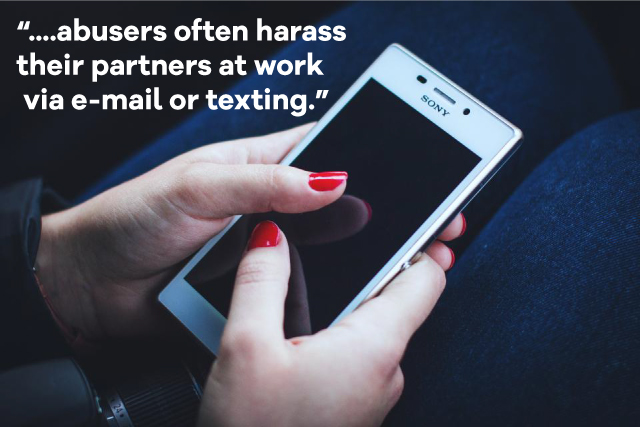What happens when your colleague is a victim of domestic violence?
More than one in three people in a 2016 Canadian survey believe that at least one of their colleagues was experiencing or had experienced domestic violence.
One in three!
Would you know what signs to look out for? Do you know someone whom you think is facing abuse? Would you know how to act appropriately?
There are so many questions that you might have and it can seem overwhelming, so we’re going to do our best to answer all of them so you can be confident in how you can help!
“Domestic violence is a private matter. Why should I get involved?”
Domestic violence rarely stays “at home”: abusers often harass their partners at work via e-mail or texting. In more troubling situations, the abuser might even come to the workplace, harassing or harming co-workers like yourself. Signs of your co-workers’ victimization might be seen in the office, as they are more likely to be miss work, have problems concentrating, and struggle to perform well.

In a 2014 study, over 70% of employees surveyed noticed that their co-workers enduring domestic violence were distracted, tired, or unwell at work. Only 4% of people were unaware that something was wrong. This means that if you suspect that something is bothering your colleague, there is probably something troubling them and you should consider reaching out.
“If someone wanted help, wouldn’t they just ask for it?”
The stigma of domestic violence can deter your colleague from disclosing their situation, and may silently wish for external support from someone like you. They also might be afraid of losing their job, as there are several instances in the news where employees are unjustly fired when they’ve disclosed their abuse.
“What are the top warning signs I should look for?”
The top four signs are:
- They seem anxious or scared about something.
- They’re frequently absent or late for work.
- They seem upset or dejected.
- Their performance has declined: they’re making more mistakes and the work is not as good as before.
“I think that one of my colleagues is actually the perpetrator/abuser…”
The most telling signs that someone might be a perpetrator are similar to those of victims: absenteeism, concentration difficulties, and declining work performance. One study found that 65% of perpetrators said that their colleague knew about the domestic violence situation; often, nothing was done with that knowledge.
“Okay, so what can I do?”
There are formal and informal approaches to support. Gestures as simple as providing emotional support can make a profound difference. Start by saying you care and are concerned. Always remember that it is not your role to “fix” the situation.
If you’re a manager or employer, you likely have the power to draft a policy for employees facing domestic violence so that every victim or survivor can expect a thorough and standardized action plan once they disclose. You can always create safety-planning procedures, such as a walk-to-car attendant program when someone feels unsafe or when it’s dark, or granting them schedule flexibility.
“I said something, but my colleague denies the abuse.”
If you have reason to believe there is concern, don’t push them into disclosing the abuse and instead, tell them that you will be willing to listen anytime when they are ready. Your colleague might be embarrassed, or just not ready to address her domestic violence. However, by showing your concern, you are demonstrating to your colleague that it is okay to talk about it.
“I said something, and my colleague admitted that something is going on. Now what?”
- Be supportive – tell them they did the right thing by talking about it and that they can lean on you for emotional support
- Listen carefully
- Tell them it’s not their fault
- If you have serious concerns about safety, call 911








